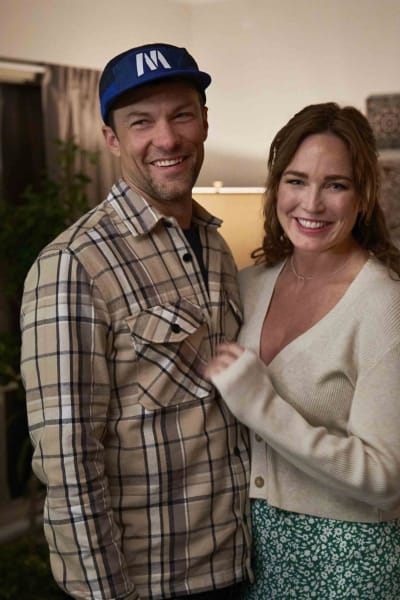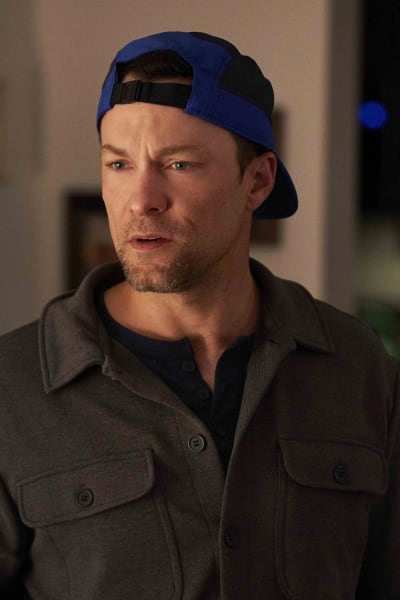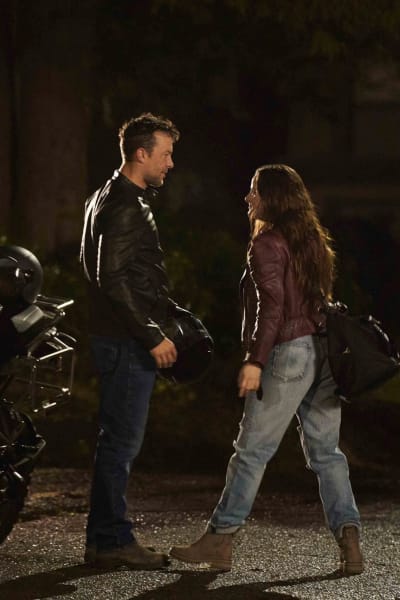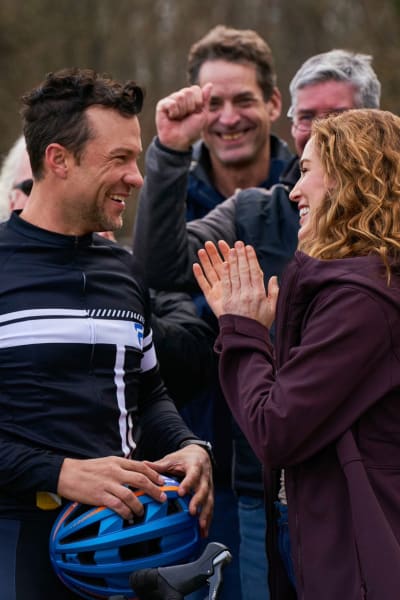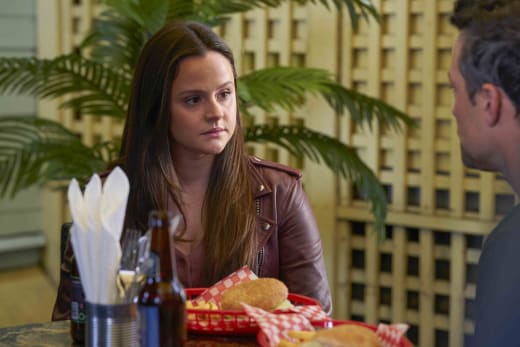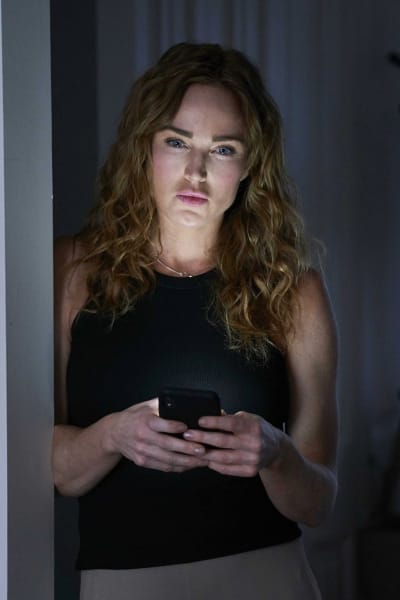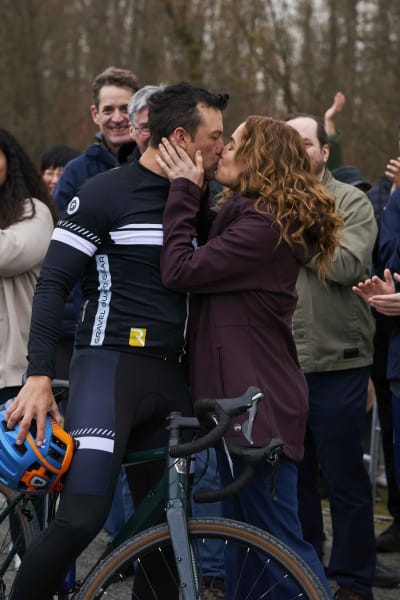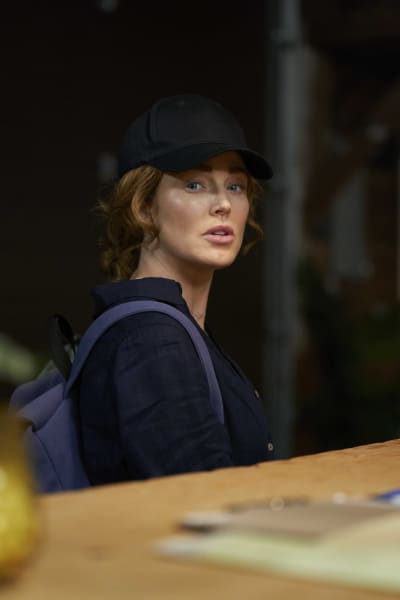They say, “Hell hath no fury like a woman scorned,” but is that the case with Kaitlin Armstrong?
Lifetime delivers another “Ripped from the Headlines” film devoted to the tragic murder of a cyclist by a yoga teacher that was deemed the “Love Triangle Murder.”
Caity Lotz stars in Yoga Teacher Killer: The Kaitlin Armstrong Story alongside hubby Kyle Schmid, and it certainly illuminates an unsettling tale.
A Perfunctory, Sensationalized Account of a Tragedy
Listen, Caity Lotz is a fantastic actress. She has gifted us incredible performances, particularly as Sara Lance in the entire Arrow Universe.
She was no less affecting as Kaitlin Armstrong, channeling something akin to Lizzy Caplan’s performance in the remake of Fatal Attraction.
Related: Are You Ready for SEVEN New Lifetime Movies & A Tragic Documentary?
The film ticked all the boxes of taking us through the highlights, for lack of a better word, of Kaitlin Armstrong’s world leading up to her brutally murdering Moriah Wilson and the follow-up as she fled the country, got plastic surgery, got captured, and evaded arrest.
Unlike some other renditions of Lifetime Films, where they deep dive into a fictionalized version of an actual event, this film didn’t spend too much time adding any real context to the leading players.
They felt like caricatures, which is an odd statement to make when we know they’re all inspired by real-life human beings.
In addition to being a mouthful, Yoga Teacher Killer was so straightforward in its approach that it could have served as a documentary reenactment.
And that’s no shade whatsoever to the cast.
Caity Lotz does a lovely job of playing up the unhinged, if you will, nature of Kaitlin Armstrong.
As we know from watching him on Big Sky, Kyle Schmid is just charming enough to make Colin Strickland sympathetic as the root of the friction in a love triangle.
And a criminally underused and underserved Larissa Dias of When Calls the Heart acclaim elicits that twinge of discontent from witnessing a young woman’s life robbed from her in her prime.
But it’s overall a fascinating conundrum the film faces.
On the one hand, it never leans deeply enough into the sensationalized aspect to be entertaining, even if it does come at the expense of the feelings, sentiments, and truthtelling of the real individuals the film reflects.
On the other hand, it doesn’t provide enough context, case facts, or conscious effort to round out the characters and connections to elicit genuine investment in this tragedy.
Related: Lifetime True Crime Movies That Hit the Mark
By toeing that line in between, it falls short of what viewers expect from True Crime on both fronts.
Does Colin Strickland Bear Some Blame in Destroying Two Women’s Lives?
The film spins an interesting narrative when it comes to Colin.
What we’re led to believe, as was also presented during the Kaitlin Armstrong Trial, is that this murder was motivated by Kaitlin’s love for Colin and jealousy over Moriah.
There’s enough emphasis on Colin’s role in dating both women that the implication is that he inadvertently is the cause of the gruesome murder.
They even dance along the lines of whether his brief relationship with Moriah constitutes cheating.
It’s complicated because the film goes out of its way to hold Colin accountable in little ways, including having his best friend end their friendship after the murder and having detectives call him to the carpet for his mishandling of things and the lies.
Related: Jennifer Love Hewitt to Direct and Star in Lifetime Holiday Movie
But in the same breath, the film also goes out of its way to lean into how Kaitlin Armstrong was an unstable woman obsessed with a man and unwilling to let him go or ever call things quits.
It’s another instance where they try to cater to both narratives to avoid taking a strong stance, and it simply doesn’t work out well for the film and its depiction of this story.
It was evident that Colin was less invested in his relationship with Kaitlin than she was.
He voiced his feelings on where they were and how little they seemed to be working out many times, but it was as if she could not recognize or hear any of it.
Setting aside the eyebrow-raising decade-age difference between Colin and Moriah and their “instant” connection that came across as superficial in its portrayal, she’s who he seemed to build a bond with.
From the TV Movie‘s perspective, his initial intentions were honest: to end things with Kaitilin and see where things could go with Moriah.
But then he comes across as a dick for going on dates with this new woman before he’s even moved out of the place he shared with Kaitlin.
He comes across as horribly insensitive when he opts to give things with Kaitlin another go despite their relationship surpassing its expiration date and leaving Moriah in the lurch.
No good can come from engaging in a relationship with someone mere days after they supposedly came out of another.
There is cause to argue that he strings both women along and leads them on.
It’s not a good look on him that he continues to spend time with Moriah behind Kaitlin’s back and doesn’t tell her anything.
Related: Single-Season Shows That Live On In Our Hearts
His intentions likely weren’t the purest, so he hangs out with Moriah and changes the name of her contact information on his phone to keep Kaitlin in the dark.
It’s evident that he’s at least aware that he’s doing something wrong; otherwise, there wouldn’t have been so much deception in the first place.
But even knowing all of that, it seems patently unfair that there’s a narrative of Kaitlin potentially being a perfectly normal, happy woman who got pushed to this point by the actions of her on-and-off-again boyfriend.
It shifts blame to him in a manner that still feels uncomfortable despite him dancing within the lines of infidelity.
Is Kaitlin Armstrong’s Treatment a Product of Societal Sexism or Enabling It?
It seemed as if there was a conscious effort to acknowledge some inherent sexism at play with Kaitlin’s story.
She was a woman deeply in love with Colin and wanted to start a family and move forward with her life.
Kaitlin’s sister implied that Colin had spent years wasting her time, seemingly keeping her in limbo with their relationship, not moving forward or backward.
Kaitlin’s biological clock was ticking, and her connection with Colin became deeper simply because she invested so much time in that relationship and wanted something to come from it.
Her desires are perfectly reasonable, yet the intensity of how she displayed them had secondary characters treating her as if she was crazy or “too much.”
It’s valid to imply that there’s some sexism in how people respond to that.
But it’s also frustrating that she could be seen as even the slightest bit of a victim because some guy led her on, and she didn’t have the wherewithal to call him out, recognize that the relationship wasn’t meeting her needs, and leave.
She further falls right into the inherent sexism of the love triangle situation by discovering that Colin and Moriah dated while she and he had broken up and opting to hold Moriah accountable for that rather than Colin.
Because the woman is always at fault, right? Isn’t that what society teaches us?
Yoga Teacher Killer Plays Heavily into Mental Illness Tropes
From the second we’re introduced to Kaitlin Armstrong, the overall sentiment is that she’s overwhelming, full-on, and “too much.”
Every other shot around her is of people put off by how intense she comes across and reacting to her behaving as if she’s just slightly “off.”
She’s the tired trope of the crazed, obsessive girlfriend who makes her entire personality and existence revolve around loving Colin.
We saw them at the yoga training with her colleagues, who barely managed to be polite as she droned on about herself and her perfect relationship.
She came across as self-absorbed and narcissistic, sending people running in the opposite direction.
Related: Grace Ryder’s Shocking Departure: How 9-1-1: Lone Star Might Write Her Out
During her birthday speech to Colin at a party, she focused on how devoted she was to him and their relationship, which had some of their friends side-eyeing her.
We’re fed all these bits about how she’s “not quite right in the head” and obsessive.
And it colors things in such a way to paint the picture that she’s mentally unstable.
It does feel like a cheap shot at those with mental health issues as she heavily falls into the category of a woman viewed as histrionic.
But it’s also something about her that largely needs to be addressed despite leaning into it.
The whole thing with her allergies seems a bit off because one can presume the entire point of her supposedly allergic reaction to mango was redirecting everyone’s attention to what she preferred.
We saw all the scratches over her torso, which were again referred to as her “allergies” when coupled with her high emotions and anxiety, felt more like a byproduct of whatever mental health issues she was battling.
Of course, the body scratches were also a reference to her scrubbing herself clean obsessively after murdering Moriah in such a cold and calculated manner.
They would volley back and forth between her being a scorned woman and one “off her rocker.”
And how Kaitlin was undoubtedly a product of the intersection between problematic mental illness depictions and sexism.
There was a lot of emphasis on her being emotionally unstable and unhinged rather than smart.
Related: Found Gains Station 19 Favorite Danielle Savre For Sophomore Season
Perhaps that was to sell the idea that she wasn’t operating in her right frame of mind when she killed Moriah and proceeded to flee the country after all of that.
But she was also smart enough to evade the cops somehow.
Most of the investigation was puzzling all around.
The paperwork screwup with them spelling her name wrong and getting her date of birth wrong, resulting in invalid warrants, was frustrating.
It didn’t make much sense that she could flee the country easily without being flagged anywhere or that law enforcement wasn’t keeping tabs on her.
It felt like she escaped the country too easily.
Conversely, the manhunt to find her leading authorities to Costa Rica was intense.
But Kaitlin even getting far enough out of law enforcement’s reach when she attempted to flee again during her transfer was also frustrating.
In Yoga Teacher Killer, the Real Victim Disappears from the Narrative
Overall, the film was serviceable, but it feels as if the real victim got lost in the narrative.
Regarding real facts about the case, we know that Moriah Wilson was a rising star, a pro-cyclist headed places with a bright future and many people who adored her.
Related: Prequel Problems: Why Are TV Execs So Fixated On the Past?
But there wasn’t enough narrative space in the film for her to feel like her story was being told amid all of this.
We barely had enough scenes with her to connect to this woman and feel the full breadth of her death, loss, and the devastation unleashed on a community.
If this were a work of pure fiction rather than inspired by actual events, she’d come across as a mere plot device.
It’s not a thought you’d like to have when watching a film inspired by true events, especially regarding the victim.
Yoga Teacher Killer was serviceable, but it’s also a film that will likely slip your mind seconds after the credits roll, which is unfortunate.
Over to you, Lifetime Fanatics.
What were your thoughts on this film? Let’s hear them below!
Jasmine Blu is a senior staff writer for TV Fanatic. She is an insomniac who spends late nights and early mornings binge-watching way too many shows and binge-drinking way too much tea. Her eclectic taste makes her an unpredictable viewer with an appreciation for complex characters, diverse representation, dynamic duos, compelling stories, and guilty pleasures. You’ll definitely find her obsessively live-tweeting, waxing poetic, and chatting up fellow Fanatics and readers. Follow her on X.
Read the original article here





